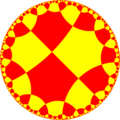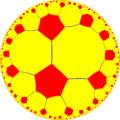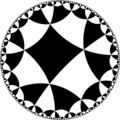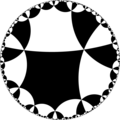Truncated order-6 hexagonal tiling
Appearance
| Truncated order-6 hexagonal tiling | |
|---|---|
 Poincaré disk model of the hyperbolic plane | |
| Type | Hyperbolic uniform tiling |
| Vertex configuration | 6.12.12 |
| Schläfli symbol | t{6,6} or h2{4,6} t(6,6,3) |
| Wythoff symbol | 2 6 | 6 3 6 6 | |
| Coxeter diagram | |
| Symmetry group | [6,6], (*662) [(6,6,3)], (*663) |
| Dual | Order-6 hexakis hexagonal tiling |
| Properties | Vertex-transitive |
In geometry, the truncated order-6 hexagonal tiling is a uniform tiling of the hyperbolic plane. It has Schläfli symbol of t{6,6}. It can also be identically constructed as a cantic order-6 square tiling, h2{4,6}
Uniform colorings
[edit]By *663 symmetry, this tiling can be constructed as an omnitruncation, t{(6,6,3)}:
Symmetry
[edit]
The dual to this tiling represent the fundamental domains of [(6,6,3)] (*663) symmetry. There are 3 small index subgroup symmetries constructed from [(6,6,3)] by mirror removal and alternation. In these images fundamental domains are alternately colored black and white, and mirrors exist on the boundaries between colors.
The symmetry can be doubled as 662 symmetry by adding a mirror bisecting the fundamental domain.
| Index | 1 | 2 | 6 | |
|---|---|---|---|---|
| Diagram | 
|

|

|

|
| Coxeter (orbifold) |
[(6,6,3)] = (*663) |
[(6,1+,6,3)] = (*3333) |
[(6,6,3+)] = (3*33) |
[(6,6,3*)] = (*333333) |
| Direct subgroups | ||||
| Index | 2 | 4 | 12 | |
| Diagram | 
|

|

| |
| Coxeter (orbifold) |
[(6,6,3)]+ = (663) |
[(6,6,3+)]+ = (3333) |
[(6,6,3*)]+ = (333333) | |
Related polyhedra and tiling
[edit]| Uniform hexahexagonal tilings | ||||||
|---|---|---|---|---|---|---|
| Symmetry: [6,6], (*662) | ||||||
= |
= |
= |
= |
= |
= |
= |

|

|

|

|

|

|

|
| {6,6} = h{4,6} |
t{6,6} = h2{4,6} |
r{6,6} {6,4} |
t{6,6} = h2{4,6} |
{6,6} = h{4,6} |
rr{6,6} r{6,4} |
tr{6,6} t{6,4} |
| Uniform duals | ||||||

|

|

|

|

|

|

|
| V66 | V6.12.12 | V6.6.6.6 | V6.12.12 | V66 | V4.6.4.6 | V4.12.12 |
| Alternations | ||||||
| [1+,6,6] (*663) |
[6+,6] (6*3) |
[6,1+,6] (*3232) |
[6,6+] (6*3) |
[6,6,1+] (*663) |
[(6,6,2+)] (2*33) |
[6,6]+ (662) |

|

|

|

|

| ||
| h{6,6} | s{6,6} | hr{6,6} | s{6,6} | h{6,6} | hrr{6,6} | sr{6,6} |
References
[edit]- John H. Conway, Heidi Burgiel, Chaim Goodman-Strauss, The Symmetries of Things 2008, ISBN 978-1-56881-220-5 (Chapter 19, The Hyperbolic Archimedean Tessellations)
- "Chapter 10: Regular honeycombs in hyperbolic space". The Beauty of Geometry: Twelve Essays. Dover Publications. 1999. ISBN 0-486-40919-8. LCCN 99035678.



